Kavita Ezekiel Mendonca, a teacher and a renowned poet, carries the legacy of her iconic father, Nissim Ezekiel, one of the founding fathers of modern Indian English poetry. In a candid interview with Urna, she reveals her life and times. An exclusive for Different Truths.
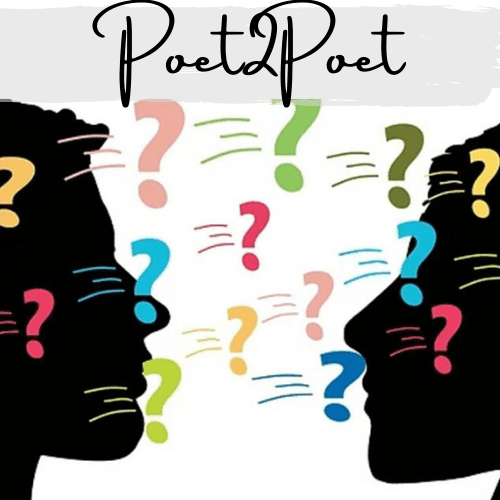
“Bombay” runs in her throbbing, pulsating veins. ‘Bombay’ too runs in the veins and the muscles, the bones, and the joints of her lucid, evocative poetry.
She was prophetically given the name ‘Kavita’, which in Hindi means poetry. And from that point onwards her life unfolded little by little, like silken threads from a spindle, to show her and her readers that nothing’s ever a coincidence.
Poetry has been her inheritance. A precious family heirloom, passed on to her by her father, Nissim Ezekiel, who is also the father of modern Indian-English poetry.
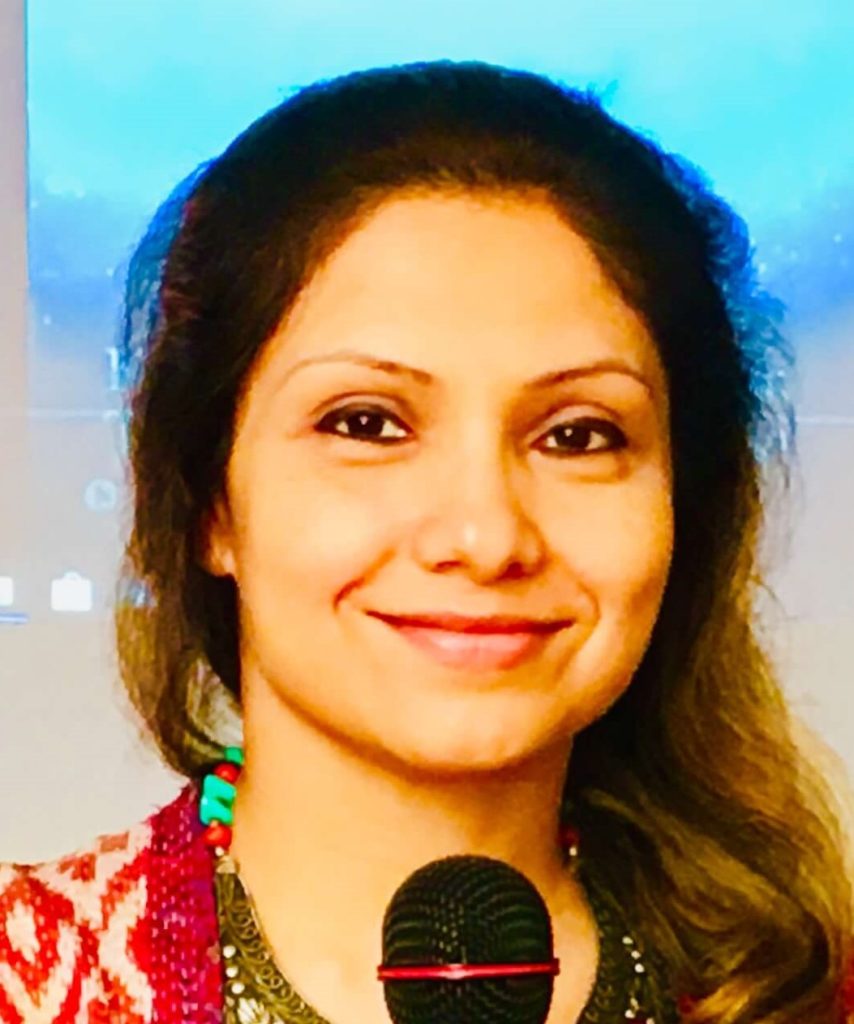
Urna: You are a quintessential “Mumbai” girl. Tell us about your school, college, and university days. Has Mumbai, an eternal muse for many poets, been your inspiration too? Does the city of your birth influence your poetry, in ways big and small?

Kavita: Before I begin, I would like to thank you Urna, and the team at Different Truths, for giving me an opportunity to share my poems and my poetic vision in your magazine.
“You can take the girl out of Bombay, but you can’t take Bombay out of the girl.”
The city of my birth, just like its name, adheres to my skin like glue. Bombay is not simply the place where I was born, it is where I find my inspiration, where my heart and my most treasured memories lie.
It is impossible to shake the vibrance, the colour, the noise, the smells, and the overwhelming feeling of ‘life’ that growing up in Bombay meant. Bombay is the city that never sleeps, yet we slept peacefully comforted by the sounds! For me here, the “silence is deafening”, as I wrote in my poem ‘India Reborn in My Soul’. It’s too quiet!
My poems contain either direct or indirect references to my home. My birthplace has had a considerable influence on my poetry, not merely expressing a feeling of nostalgia but celebrating the wonderful family I was blessed to be born into.
However, the city is not the same now, not because of the changes that have taken place, but because of the absence of my family, particularly of my father, which I feel keenly. I echo the sentiments in his poem, ‘Island’ when he says, “I cannot leave the island/ I was born here and belong” (Nissim Ezekiel). Although I have made the choice to live on another continent, as I have voiced my feelings about home, in my poem ‘Tell Me If You Know Where Home Is’.
“I’ve never really left home The place is always in my head, becoming as a noisy child’s rattle, If I shake my head from side to side As Indians do back home, it still doesn’t help.”
I attended Queen Mary school, which was run by Protestant missionaries, and was considered to be one of the best schools in Bombay. Here, I gained the values of discipline, good grooming, hard work, healthy competitiveness, and a deep knowledge of The Bible.
Many of the values were like the ones I was raised with. So, it was the right choice of school for me.
It was a time where I made wonderful friendships, which have remained fresh to this day. My favourite subjects were English, French, Hindi, Marathi, and Indian History. I participated actively in school athletics and consistently managed to stand on the victory podium in third place, in track and field unless I was running in a relay!
At St. Xavier’s College, I enjoyed myself thoroughly, singing in the college choir, writing, and publishing poetry in the college magazine and being a member of the Social Service League, which helped build wells in the outlying villages.
Of course, the best part was sitting with friends in the cafeteria, enjoying the food there, and the samosas and the bhel at the food truck in the mornings, and simply having fun and worrying about our looks.
The boys in my circle of friends were kind and chivalrous, the girls sincere and genuine. St. Xavier’s College was the happening place!
I was sixteen when I started college and was quite baffled by the passion with which the professors delivered their lectures on various subjects, such as World History and Logic.
I didn’t quite understand where I was headed, and what the end goal of all the learning was. I simply went along with the flow, since I was told by my parents that it was good for me to get some solid degrees, to pursue a professional life in the future.
My father maintained that, eventually, I would come to realise the reason I had to go through such a rigorous education. I trusted his advice. My mother continually emphasised the importance of study, as the goal was to get a good job.
For my bachelor’s degree, I majored in English and French and loved the French writers, Camus, and Maupassant. I had developed my love of French in school, and it continues to this day. The French professors, like the English ones, were excellent. Their knowledge and dedication to their subjects were bewildering, but admirable at the same time.
Of course, like all teenagers I wanted to become a rock star since I loved to sing, but my father said I could do that as a hobby! He said that I had to get a professional designation. I am so glad I heeded his advice.
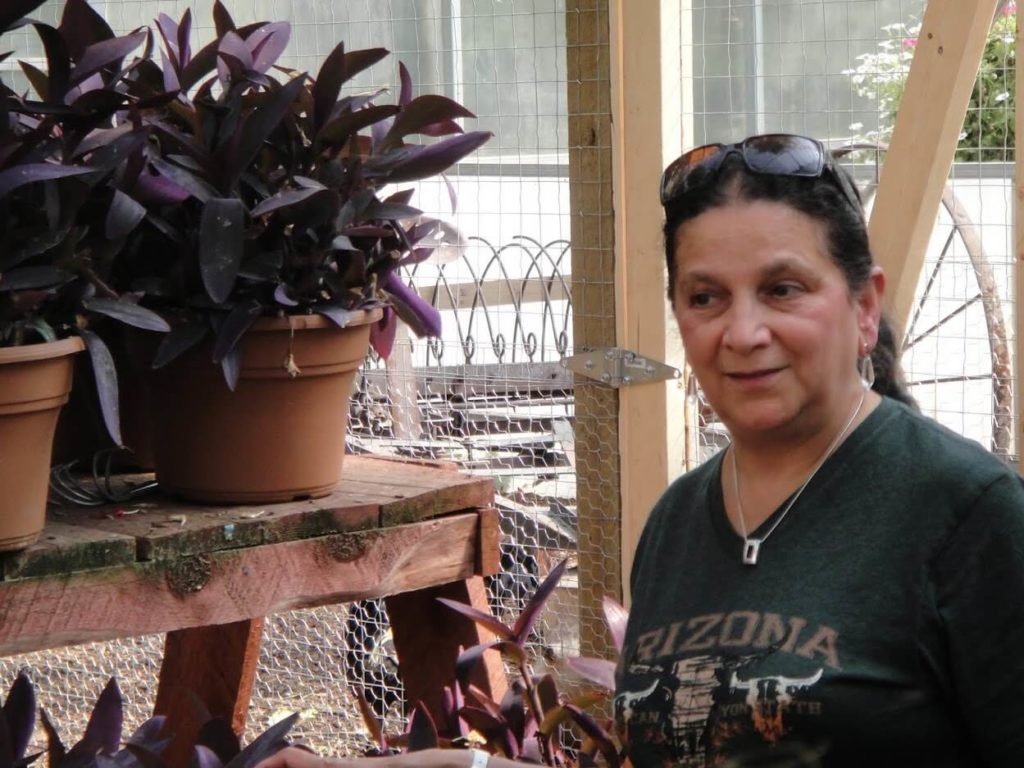

Urna: Tell us about your teaching experiences in India and overseas. Robert Frost once wrote, “I am not a teacher, but an awakener”. Did the process of teaching poetry awaken and rekindle your own love and understanding of poetry, all over again?

Kavita: As I mentioned earlier, I was sixteen when I first entered college. I have always admitted that I didn’t really understand the finer nuances of the poetry I was studying. It was also a question of maturity. What I enjoyed most was reading about the lives of the poets and novelists, the influences on them, their upbringing and education.
I stayed till closing hours in the college library, making copious notes on this aspect of poetry. I also enjoyed reading Literary Criticism at the master’s level. It was when I started teaching and began preparing for my classes, I delved deeper into the meaning behind the poems and the different poets that formed part of the designated curriculum.
Interacting with my students and the wonderful discussions we had in the classroom, brought fresh perspectives and ways of interpreting poetry. The conversations with students in my Advanced Placement English class in the International School where I taught for sixteen years, were particularly stimulating.
On Teacher’s Day this year, I received a thank you message from one of my students. She expressed her gratitude to me, for teaching her life lessons “much beyond the books”. For me as a teacher, this is my greatest reward. I get several messages from students acknowledging not just my teaching of literature, but of the insights into life that they got from me. That makes me truly happy.
I love languages, and so the opportunity to teach French and Spanish in Canada, was a godsend. It brought out the best in me as I discovered I had a real passion for languages. I was at my best in the classroom when I was teaching French and Spanish language and culture.
My father being a poet, inculcated in me a love of poetry from a very early age. I was blessed to attend his poetry readings, and have him as my professor of American literature, while pursuing my master’s degree at the University of Bombay.
I loved teaching creative writing, and the novels and poetry of D.H. Lawrence and Gerard Manley Hopkins. I read all kinds of poetry now, enjoying most of the poetry of those who write about ordinary things in direct and simple language, something very much inspired by the kind of poetry my father wrote.

Urna: Poetic use of imagery and symbolism often helps the reader to make sense of whirlwind emotions, bringing about a kind of mediative solace, an existential calm. What influenced your love for Zen Poetry?

Kavita: I have a deep love of peace and all things that contribute to peace, and things that bring stillness to the mind and the heart. So much of this I have inherited from my father.
It is usually in my love of Nature that I find my Zen. Perhaps Zen can be defined as a specific type or a school of poetry, but for me it is poems that are more meditative, quiet, and spiritual in nature. This is also a hallmark of the Zen poets. My father talked a lot about Zen to me, and he even wrote Zen telegrams.
In a park, in Merida, in Mexico, I experienced the pure joy and peace of listening to a group of Peruvian performers playing popular tunes on their Andean pan pipes. Such music creates the perfect “Zen moment”. It brought the silence of the mountains to me. The band members were poetic in their presentation, and their music was soulful and calming. I don’t like being alone, but I love and appreciate silence.
There is Art that paints pictures of stillness, and peace that creates Zen moments. I love the ‘Still Life’ style of Art the best, as it speaks peace and calm in a world of chaos and noise. I also love ‘Landscape Art’, especially that of mountains, rivers, railways in scenic settings, and Indian and English villages, for the same reason.
There are also forms of dance that inspire and create a feeling of Zen. My goal is to write more Zen poetry. Here is an example of a Zen poem I wrote last year:
Sun: A Zen Poem
Look for the Sun Within you Then you will feel the warmth On every kind of day.”

Urna: What, in your opinion, are the most important elements of good poetry? What is the birthing process of poems for you?

Kavita: If a poet is honest, as in true to his or her experiences, and describes them without embellishment and artificial use of language, the poetry comes across as sincere, powerful, and relatable.
Using high-sounding words that don’t fit with the theme, by simply imposing them on the style and content of the poem, or with a desire to impress, negates and diminishes the pure joy which true poetry brings to the reader. The best poetry comes from one’s own experiences and observations about life; the poet must be deeply connected with his or her subject. If the poet expresses himself or herself boldly and without any pretensions, the poetry is natural and not contrived. It is easier to detect pretentiousness than one thinks.
The themes of poetry can be far ranging, from the supernatural, outer space or dreams. These may not be observable phenomena, yet can be transformed into good poetry with the poet’s imagination.
A poet must discover his or her own voice and not imitate or copy other poets. If one reads a lot of poetry, it is natural to be influenced by the poets one admires or relates to, but blindly writing like them is to lose one’s originality. Of course, the appeal of a poem or a painting is subjective by its very nature. When a poem is published, different readers react to it differently, depending on individual taste. Sometimes you may write a poem and think it’s your best one, but it may not appeal to an editor and gets rejected for a publication. This is not a happy experience but is part of every writer’s lot.
One of the first definitions I learned about poetry is Wordsworth’s memorable definition “Poetry is the spontaneous overflow of powerful emotion.” My own definition is an adaptation of his definition. “Poetry is the powerful overflow of spontaneous emotion”.
One of my favorite poets is Charles Bukowski. In his poem, ‘So You Want to Be a Writer’, he expresses this idea in his opening lines perfectly:
“if it doesn’t come bursting out of you
in spite of everything,
don’t do it.
unless it comes unasked out of your
heart and your mind and your mouth
and your gut,
don’t do it.”
And towards the end of the poem, the lines I love best,
“unless the sun inside you is
burning your gut,
don’t do it”.
Bukowski’s poem is one of the best lessons in how to write poetry. To use Bukowski’s line from the same poem again, unless a poem comes “out of my soul like a rocket”, I don’t write it.
The other great lesson in writing poetry comes from my father, the late poet Nissim Ezekiel. In his poem ‘Poet, Lover, Birdwatcher’, he wrote “The best poets wait for words”.
That advice has helped me develop the patience to wait, and not rush to write a poem. Revising a poem seven or eight times was another valuable lesson he taught me. A poem should communicate directly to the reader. He or she should be able to engage with it, and find it stimulating and enjoyable. If it is too complex, or there is no connection between the various ideas, the reader will become frustrated and simply put it aside.
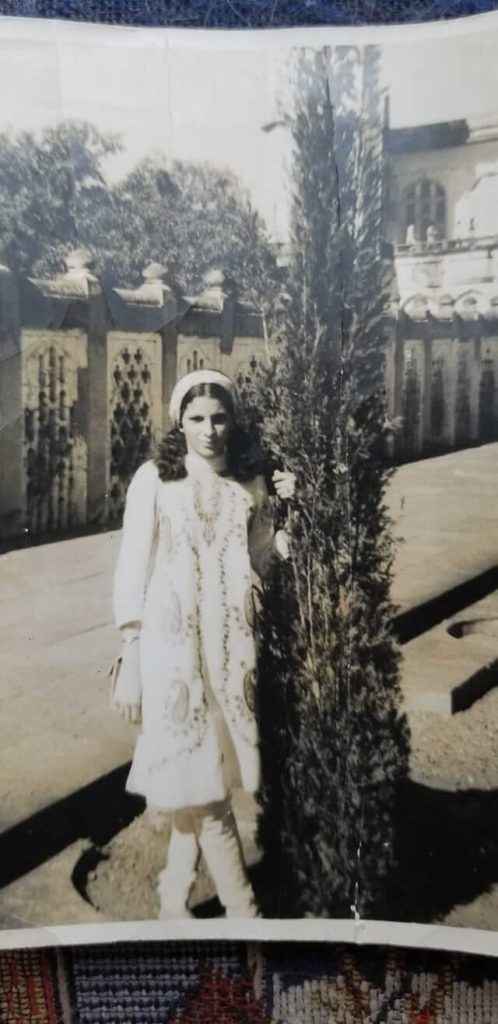
Kavita early photo 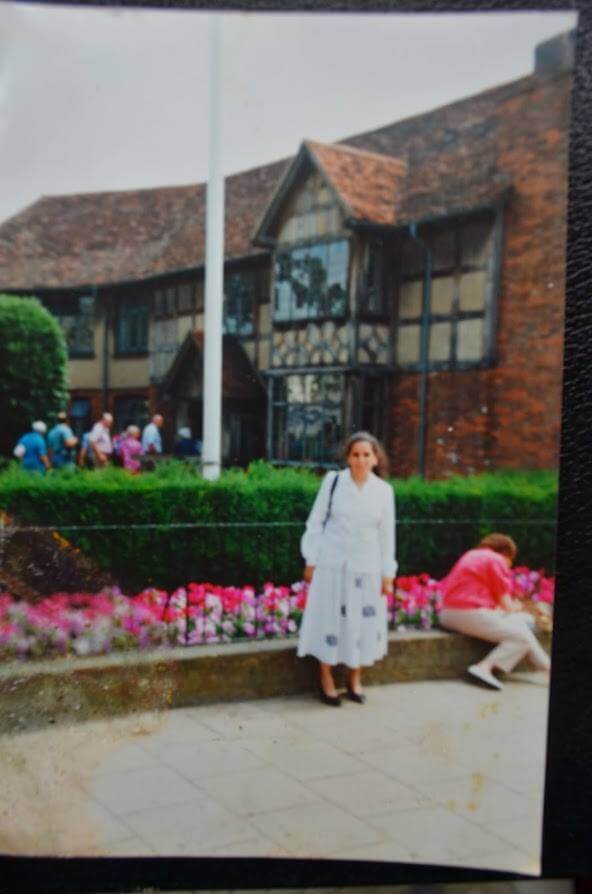
Kavita at Shakespeare’s home 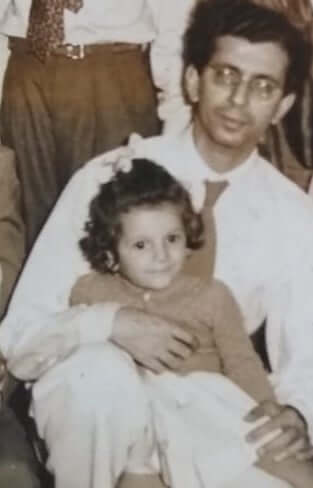
Kavita with her father

Urna: What was it like to be born in a Bene Israel family in Mumbai? Tell us about the various languages you grew up with, and the integration process. Does your new chapbook, the Light of the Sabbath explore your Indian-Jewish heritage? In what ways do these poems reflect your growth and/or departure from your earlier works?

I was born and raised in a Bene Israel Jewish family with amazingly open-minded parents and grandparents. They followed the customs and traditions of the Jewish faith, but not in a rigid manner. We were Liberal Jews. Religious freedom was a true blessing for me, and has shaped me in becoming the kind of individual I am today.
We lived alongside people of all faiths and developed an easy and natural respect for Muslims, Hindus, Anglo-Indians, Christians and Parsis. I grew up in the Bombay of one world. We celebrated Id, Diwali, Christmas, Navroze and of course our own festivals, like Rosh Hashana and Passover.
The differences between us and neighbours and friends of different religions, were completely devoid of any kind of religious tension. There was an atmosphere of acceptance and shared identity as Indians. We celebrated our differences by enjoying the diversity of beliefs held by our fellow Indians, and even members of my own family who had married outside of the Jewish faith. They were more than welcome in our home, and were very much a part of the family.
At home we spoke Marathi and English and prayers were said in Marathi and Hebrew. The Jews blended seamlessly into the Indian landscape and faced little or no discrimination.
I attended a Christian school and learned a great deal about the Christian faith. As I grew older, I began to explore my Jewish heritage, mainly through the memories I had about the warm and loving personalities, like my aunt, whom I have immortalized in my poem ‘Light of the Sabbath’. My chapbook of the same name is based on the things about the Jewish faith I learned from her.
My mother was a woman of great faith. No matter what personal adversity she suffered, she always said ‘God is great’.
That faith has stuck with me and helped me tremendously in times of crisis. It is natural as one gets older, to explore one’s roots and discover how they have played a part in forming one’s view of the world and personal philosophy.
Growing up, we never talked about the Holocaust. It was only when I read ‘The Diary of Anne Frank’ and later watched films like ‘Schindler’s List’, that the full horror of the terrible injustice done to six million Jews sank into my awareness. I began to feel I was carrying a personal burden. I was overcome with a deep sense of grief and anger as expressed in my poem ‘I still sing The Shema’. Listening to the stories of survivors fills me with not just great anger, but a deep sadness.
I can feel that I have made advances in both the content and style of my poetry from my earlier book, as I have more time to reflect on my writing and hone my craft. For many years, teaching full time and raising two children left not much time or energy to devote to writing. After the publication of my first book there was a hiatus in my writing. In the last couple of years, I have started writing again with renewed energy and joy. Writing is hard work, but it’s also a lot of fun.
***
Urna reads a poem by Kavita Ezekiel Mendonca
***
Five Poems by Kavita Ezekiel Mendonca
#1: THIS IS THE CITY
(After the Nursery Rhyme, ‘This Is the House That Jack Built’.)
This is the city my father loved That he called home, that wrote his poems, That created the slums, that built the skyscrapers That jammed the trains, that crowded the buses Where he walked the streets - that somebody built. This is the city that I have loved Where I was born where I was raised Where I ran for the buses, in four-inch heels Danced in discos all night long, studied in the colleges, sang in choirs Dated the boys, then married a man - that I loved. This is the city where I lived by the sea Ate street food, shopped fiercely, listened to Rock music Read Enid Blyton, Ayn Rand, borrowed from friends, Practiced for Sports Day, studied for exams - that I did not love. This is the city that I have left, I know not why, I cannot remember This is the city lodged in my soul, something stuck in a tooth, I cannot remove. This is the city that I still love, with its dust and grime, will always be mine That I must in Hindi call ‘Bombay Meri Jaan’, meaning Bombay my love A city whose name I no longer can pronounce - that is now called Mumbai.
#2: GIVE ME OIL IN MY LAMP
Grandmother took me to the old synagogue Walking down the pot-holed sidewalks Of a noisy Bombay Street, close to her home, Every square inch populated with humanity. The oil lamp in the very old synagogue hung high from the ceiling For a few rupees we could keep the light burning. She was afraid to climb the ladder provided by the caretaker In case she missed a step, I was afraid for her too. So, he took the donation and lit the lamp. I must cover my head with a handkerchief she would pray to the prophet Elijah for the oil never to run out, The lamp must never die out. Wanting to know in whose name he could make the receipt (I did not have a Jewish name) ‘Change it for the receipt’, she said, matter of factly ‘Or the caretaker will get confused’. So, I went from being called Kavita to Elizabeth For the sake of a two-rupee receipt I really did not want, or need. Mother did want to name me Elizabeth, I recall. “It’s ok. When you get home You can go back to your real name Or your father will be upset”, grandmother said calmly.
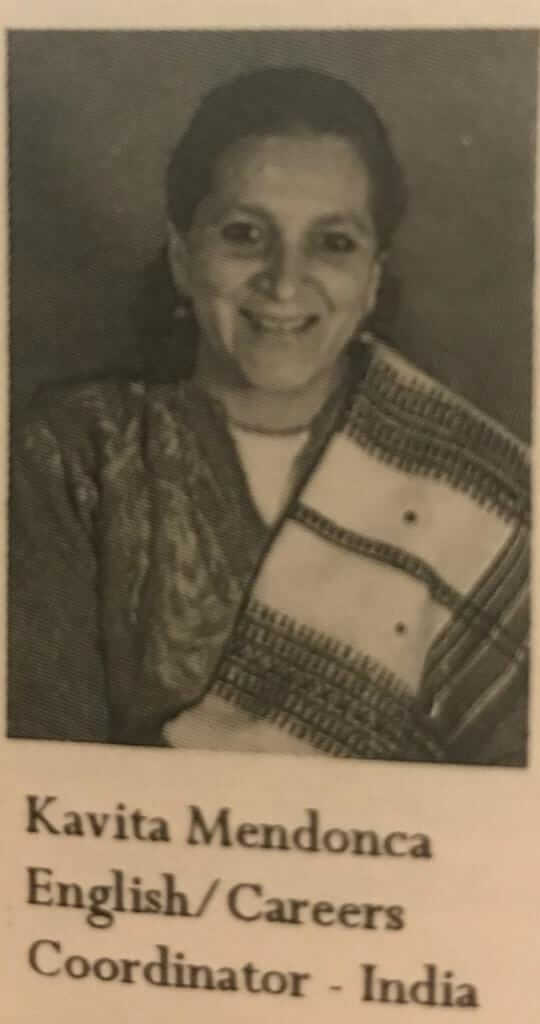
Kavita as teacher 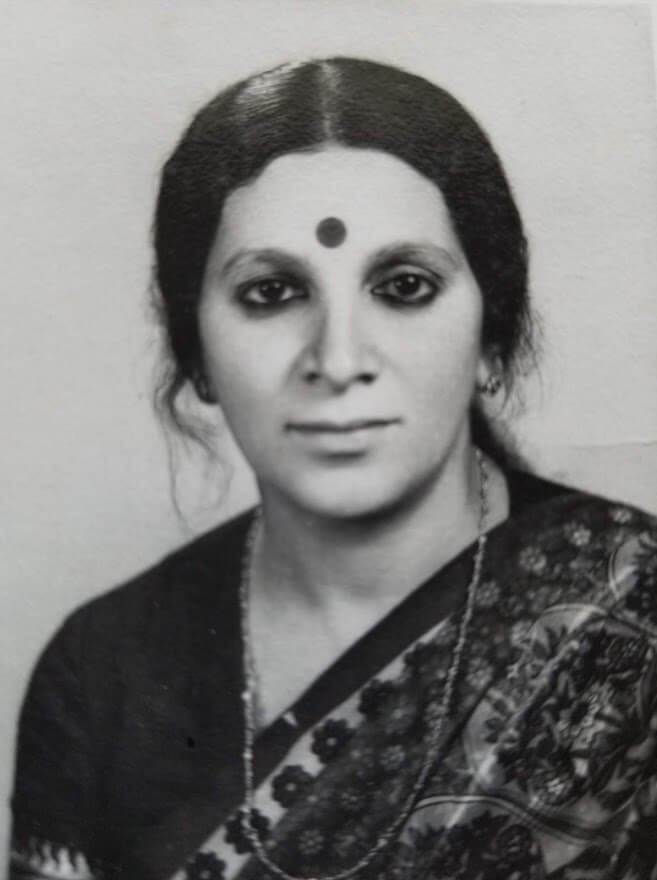
Kavita early photo
#3: A PRAYER FOR THE TOUGH TIMES
Lord, help me reach inside my soul Find the music to make me whole Help me embrace the cold and snow Practise mindfulness and take it slow Pray for those I cannot meet Love the quiet of the streets Help me cook and clean with grace Do all the chores with a smiling face Share with those much more in need Bring healing, to those hurting, with Your speed Help me think and read and write Help me simply to fight the good fight Remove from our hearts all worry and fear Grant us good measure of Your cheer Lord, with Your Word please shed more light Show mercy for our human plight
#4: A PSALM OF HOPE
Blessed are you if the breath of life Has chosen you for a new day Allowed you to waken early With eyes to see the early skies of a new dawn, If you rise late, to behold the bright yellow sun. Blessed are you who have been granted ears to hear The sweet symphony of birds, the gentle sound of trees Whisper in the morning breeze outside the kitchen window. Blessed are you if with nostrils filled with breath To smell the aroma of ginger tea or steaming coffee, If in a place called home the breath of life Filled you like an overflowing water pot Drawn from the village well, You have awakened to the gift of hope. The world will look different if you can spend a day Without fearful utterances of the words Virus, Pandemic, Lockdown, Render them voiceless and faceless Even for a moment, to grasp the gift of time. From a new morning until The splendid moon pours moonlight Makes its announcement of night, You have lived a day of hope, your prayers For those robbed of life’s breath Will bring to your consciousness The precious gift of life granted to you. The world will be restored to its natural order In God’s good timing with hope around every corner Reach out your arms, commune with it Breathe hope and pass it on.
#5: PEACE
I dream of a ‘thousand paper cranes’ Flying horses with silken flowing manes Neighing with abandon over the parched earth Birds dropping feathers of joy and mirth To be inside the bubble the blue whale blows To jump high up on the trampoline in a circus show To swim with the sharks without a cage To live in a world without any rage To paint the sun in a rare shade of yellow To trap the moon under my night pillow I dream of the twig in the beak of the dove Bringing love and kindness from a God above I dream the year will be different soon And to this virus mankind will be immune I dream the weeping willow will weep no more I dream of peace from shore to shore.
Photos sourced from Kavita Ezekiel Mendonca

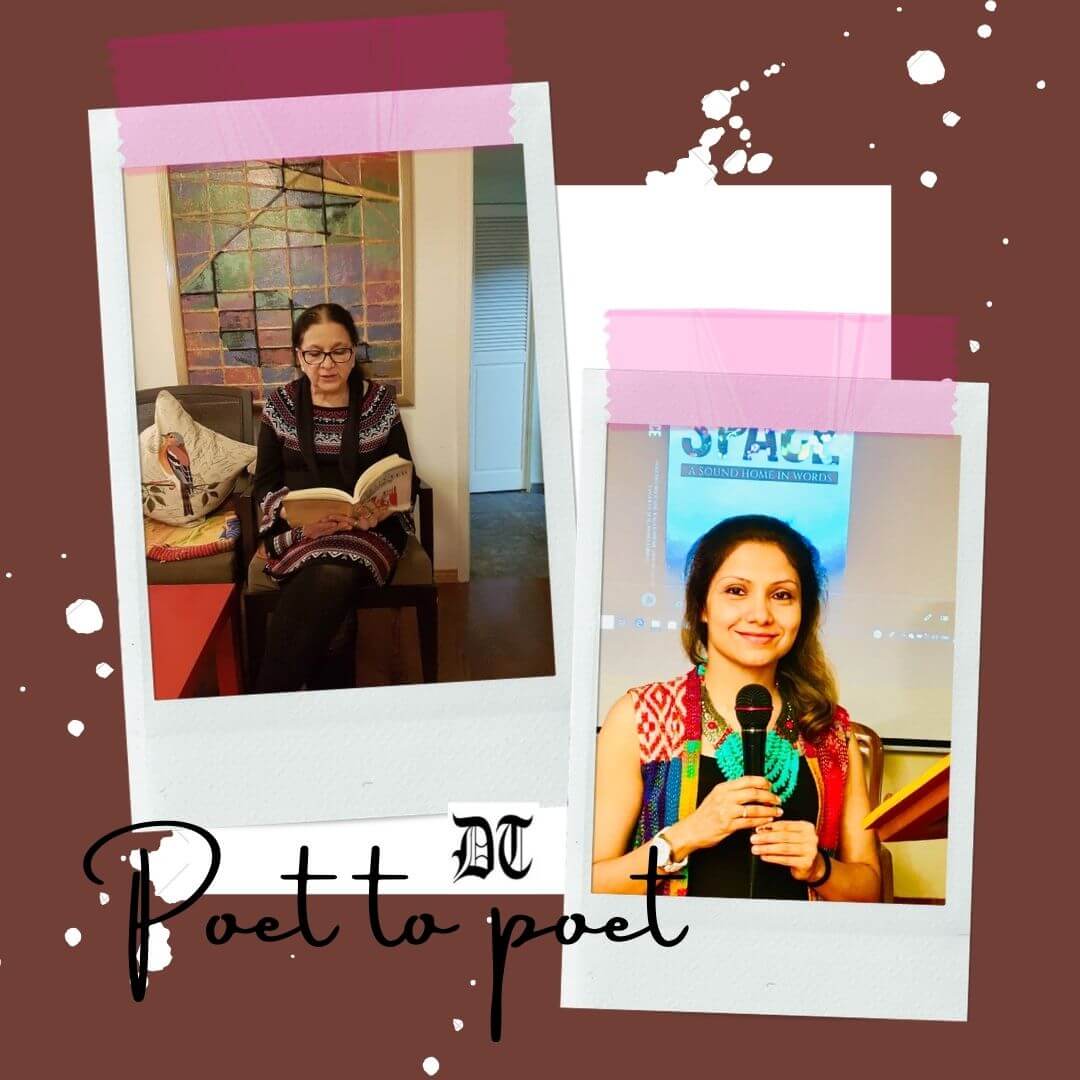
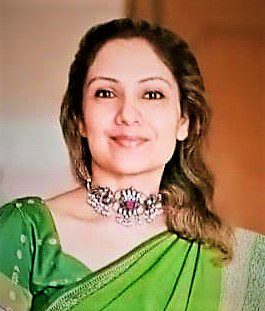

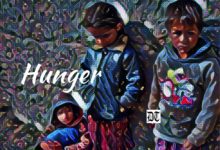

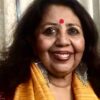 By
By
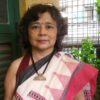 By
By
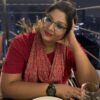 By
By
 By
By
Superb interview! Thoroughly enjoyed reading it!